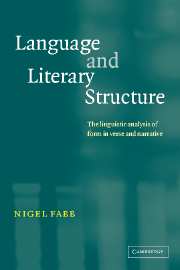6 - Line-groups in metrical verse and in narrative
Published online by Cambridge University Press: 22 September 2009
Summary
For most verse texts, lines are grouped into stanzas or verse paragraphs. In the previous chapter I argued that the division of a text into lines and the location of line boundaries holds only by implicature. In this chapter I argue the same for the organisation of lines into line-groups and the location of line-group boundaries. Organisation into stanzas or other groupings of lines is an implied form of the text, and not an observer-independent fact of the text.
Line-grouping is implied
In this section I undertake a detailed analysis of three texts to show that linegrouping is implied. I begin with a poem in which line-grouping is implied both by layout and by other means; then a poem in which layout tells us that there is no line-grouping but there is other evidence which tells us that there is; I conclude the section by looking at a poem in which there are simultaneous but contradictory line-groupings.
Line-grouping is unambiguously implied by layout and other means
Love
¶A Love's an headstrong wild desire
To possess what we admire:
Hurrying on without reflecting,
All that's just or wise neglecting. 4
Pain or pleasure it is neither,
But excess of both together;
Now, addressing, cringing, whining,
Vowing, fretting, weeping, pining, 8
Murm'ring, languishing and sighing,
Mad, despairing, raving, dying:
Now, caressing, laughing, toying,
Fondling, kissing and enjoying. 12
Always in extremes abiding,
Without measure, fond or chiding:
Either furious with possessing,
Or despairing of the blessing: 16
Now transported; now tormented;
Still uneasy; ne'er contented.
None can tell its rise or progress,
Or its ingress or its egress, 20
Whether by a look produced,
Or by sympathy infused.
¶B Fancy does so well maintain it,
Weaker reason can't restrain it, 24
But is forced to fly before it,
Or else worship and adore it.
Henry Baker, ‘Love’, 1725 (L:163)- Type
- Chapter
- Information
- Language and Literary StructureThe Linguistic Analysis of Form in Verse and Narrative, pp. 178 - 214Publisher: Cambridge University PressPrint publication year: 2002



